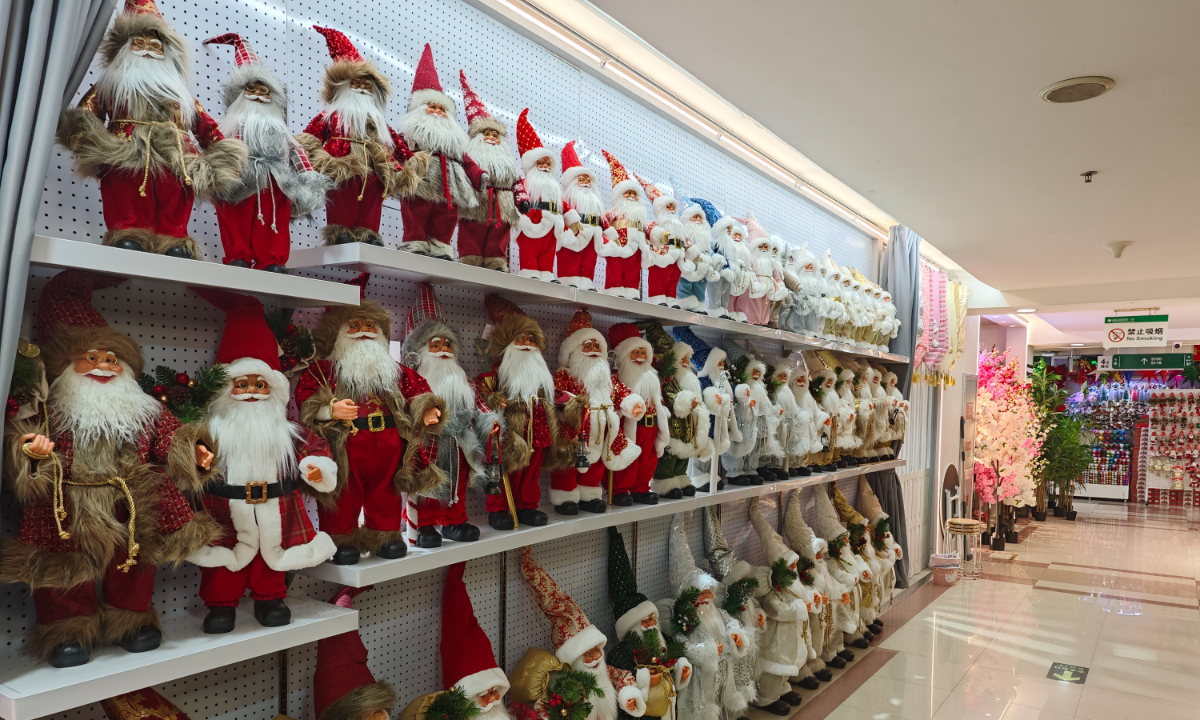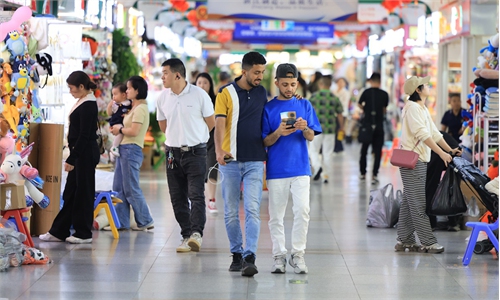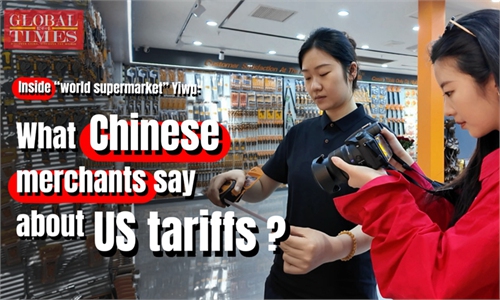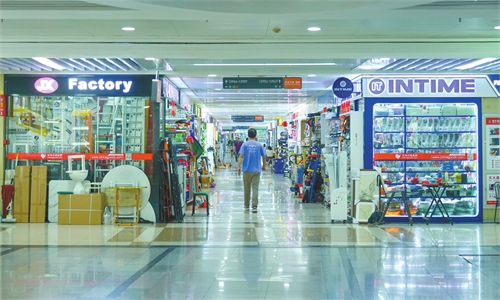
Santa figures displayed at shelves of a shop in the Yiwu International Trade Market on April 11, 2025. Photo: Yin Yeping/GT
Even though Christmas is eight months away, the "Christmas sections" at the Yiwu International Trade Market are already packed, including inflatable bears wearing Santa hats to rows of decorated trees.
"Our customers usually begin placing orders at the end of each year. Busy shipping starts from April to June. Some products take 50 to 60 days to deliver," said Yiwu merchant Zhang Yong.
With the US recklessly launching trade wars by imposing steep tariffs, including prohibitive tariffs on Chinese goods, the city of Yiwu in East China's Zhejiang Province, known as the hub of small commodities, has once again drawn global attention.
The tariffs on Chinese products could put "Christmas at risk" due to the limited toy production capacity in the US, Greg Ahearn, president and CEO of the Toy Association of the US, said in a recent interview with CNN.
As Ahearn explained, 96 percent of toy manufacturers in the US are small and medium-sized enterprises, which cannot match the production scale of Chinese firms, so it will take a considerable amount of time for US manufacturers to catch up with their Chinese counterparts.
Ahearn said that production of toys for Christmas should be in progress from April to June but the process is upended by the tariffs. "Everybody wants to make sure that Christmas is going to be fun, and there will be toys under the tree for kids this year."
Despite the headwinds brought on by the US tariffs, the situation in Yiwu tells a different story - it may well be that American families are most likely to face an expensive Christmas, local merchants said.
There has been no sign that business in Yiwu has withered because of the US tariffs. "Overall shipments including those to the US have increased, even with higher prices," said Yiwu merchant surnamed Zhang. He had just shipped a container of Christmas items to the US.
'A massive market'
"Christmas is a Western tradition, but the West isn't just the US - it's a huge market," Zhang said, noting that these are also popular in Europe.
When a Global Times visited Zhang's shop, packed with Christmas decorations ranging from wooden carved Santas and reindeer to colorful textured ornaments that all evoke the holiday spirit, Zhang was busy calculating accounts on his computer.
Wang, another merchant, who owns a Christmas tree factory in Yiwu, was in a similar situation. She told the Global Times that, recently, an American client had to pause a confirmed order for Christmas trees, citing uncertainty caused by the elevated US tariffs.
But Wang is not concerned about her business. Her worry is for her American client. "If he doesn't place the order with us, he probably won't place it anywhere else. Our strong production capacity and competitive prices give us a clear edge," she said. "But if he doesn't order soon, the goods may not arrive in time for the coming Christmas," she noted.
Yiwu's trade seems to keep on thriving. According to data that Yiwu Customs provided to the Global Times, in the first two months of this year, exports from Yiwu to the US reached 13.87 billion yuan ($1.9 billion), a year-on-year increase of 22.6 percent, led by machinery, electronics and plastic products such as toys and other Christmas gadgets.
Li Xiang, who runs a Christmas shop specializing in handmade and high-end ceramic decorations, said everything from carved wooden designs to painted finishes is done by hand. His American buyers recently placed orders worth more than 4 million yuan.
To deal with the US tariffs, many Yiwu businesses are actively exploring new markets elsewhere. Demand is growing quickly in regions like the Middle East and South America. "We have shifted our focus to a broader market where demand is more stable and orders are massive," Li said.
A long-time customer from Brazil, Leandro Partata, backed up Li's words. He has been in Yiwu since the end of March and placed $215,000 worth of Christmas orders there.
"In addition to Christmas goods, I'm also placing orders for other products like home decorations... I come here often because the products are very cheap and of good quality, and there are so many options so you can find almost everything in one place," he told the Global Times.
'Long-term reputation'
Yiwu merchants have demonstrated rising resilience and appeal in the past two decades, living up to the city's reputation as the world's "supermarket." When the Global Times reporter visited the place in 2021 during the pandemic, there were few foreigners in the market. But that did not stop overseas buyers from placing orders. Thanks to Yiwu's competitive products and years of building up trust, many clients, including those from the US, continue to place orders online.
"Today, things are definitely better than they were during the pandemic months," said Luo Xiangmei, while organizing a shipment of nail products and other Christmas gifts. "Our products are competitive worldwide, so why should we worry too much about the US tariffs?"
Luo has worked in foreign commerce at the Yiwu market for many years. On April 9, she completed a shipment for an American client. "The customer did not refuse the goods, or ask for a discount because of the tariffs," she said.
"Our given price is only two yuan per set while they can sell for at least $2 in the US market. It is still a great deal for my client." She said. Even with a profit margin of only 10 percent, each container-sized order will still ensure solid earnings.
More importantly, years of consistent quality have built deep customer trust. As she spoke, she showed a message from a long-time client to the Global Times reporter. It read, "No inspection needed. I trust you." She smiled with pride. "The client doesn't need to inspect the goods in person, and we ship them directly," she said.
This trust has been nurtured through 37 years of business partnership, from Luo's mother founding the factory, to Luo and her husband running the business, and now her daughter opening a stall in the market. Three generations have worked together to build the reputation of the family business.
This kind of business reputation takes long-term efforts, Luo noted.
So, facing ongoing volatilities in global trade, she remains confident. "I believe in free trade, and Yiwu's role as the global free trade hub of small commodities will not change."



